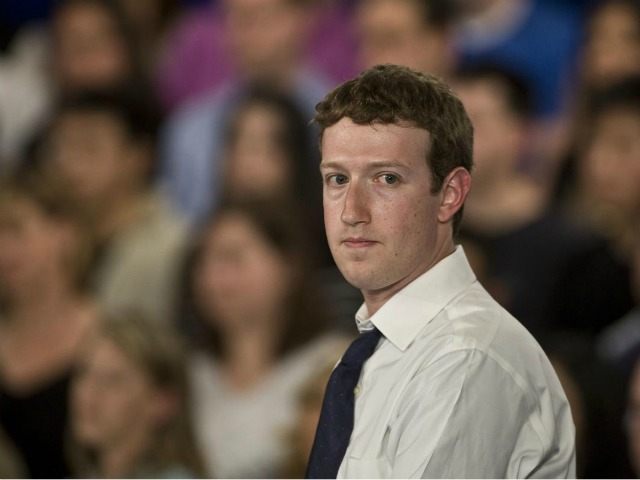Gizmodo has revealed what everyone knew already: that Facebook’s employees are biased against presidential contender Donald Trump.
In response, the social network has hurriedly insisted that it’s a “neutral” platform and won’t use its considerable power to influence the election. But who really believes them?
The Gizmodo leaks showed employees voting in an internal poll to decide what questions they should ask CEO Mark Zuckerberg at his weekly Q&A. One of the more popular options was a loaded question concerning Republican frontrunner Donald Trump: “What responsibility does Facebook have to prevent President Trump in 2017?”
It’s exactly the sort of question that ultra-progressive tech hipsters in Silicon Valley would ask their CEO. Facebook has since insisted that they will not seek to influence the election. But I’m more than a little sceptical.
First, let’s examine Facebook’s public statement on the controversy:
Voting is a core value of democracy and we believe that supporting civic participation is an important contribution we can make to the community. We encourage any and all candidates, groups, and voters to use our platform to share their views on the election and debate the issues. We as a company are neutral — we have not and will not use our products in a way that attempts to influence how people vote.
The first thing to note about this statement is that it’s technically an impossible commitment for Facebook to make. The company has long switched from user-curated newsfeeds (where ordinary people choose what information they come into contact with) to an algorithmic model, in which Facebook controls what content gets pushed to its users (and when). If Facebook’s algorithms think a news story is interesting to you, they’ll make sure you see it.
By definition, a service that influences what information you see also influences how you vote. But let’s give Facebook the benefit of the doubt, and assume that their spokesman was merely trying to explain that the social network’s algorithms don’t privilege some presidential candidates above others.
Even then, it’s still hard to believe.
Facebook CEO Mark Zuckerberg has spent the last few months taking a string of outlandishly progressive poisitions (even by Silicon Valley standards) that are the polar opposite of Donald Trump’s. He’s effectively banned employees from criticising Black Lives Matter. He’s praised Germany’s immigration policies, urging the U.S. to “follow their lead.” And, of course, he’s criticised Donald Trump’s policies directly, warning against “fearful voices calling for building walls.”
Zuckerberg has also approved political censorship on Facebook. After he personally assured German Chancellor Angela Merkel that he would crack down on anti-immigration sentiment on the platform, Facebook launched a well-funded, Europe-wide campaign against “anti-migrant hate speech.” Zuckerberg and Facebook COO Sheryl Sandberg have since made regular trips to Germany.
In other words, Facebook are already intervening in European politics. Why should we believe they won’t do the same in the U.S. election, particularly when Donald Trump threatens Silicon Valley’s all-important H1B migrant visas?
It’s not as if Facebook would be the first. As Breitbart Tech revealed in February, Twitter deliberately manipulates its algorithm to favour a trusted “whitelist” of news sources, while pushing sources on a disfavoured “blacklist” down users’ search results. It’s hard to imagine that Facebook, whose CEO’s rabid progressivism easily matches that of Twitter’s Jack Dorsey, won’t one day go down the same route.
After all, as UCLA law professor Eugene Volokh reminded Gizmodo, there are no legal obstacles in Zuckerberg’s way. He could, if he wished, be as biased as he liked in his management of Facebook. “Facebook has the same First Amendment right as the New York Times,” said Volokh. “They can completely block Trump if they want. They block him or promote him.”
Of course, taking an explicitly political stance might lose Facebook users. But then again, the political stances of the major newspapers also shut out readers of some political stripes while attracting others. Moreover, sites like Twitter and Reddit have proven that political bias can be introduced slowly, covertly, so that the majority of users don’t know what’s happening. (Indeed, we still don’t know the full details of how Twitter judges what news appears in front of its users, and when.)
With no legal barriers to stop them, it seems inevitable that social media barons like Zuckerberg will eventually seek to emulate the old media barons, who imposed their own political values on the outlets that they owned. Just as unbiased news reporting is now a thing of the past, perhaps one day soon we shall remember unbiased social networks as nothing more than a memory: a utopian dream that could never have lasted.
Of course, one chilling fact ought to be remembered: social media barons are vastly more powerful than their predecessors in the old media. They don’t just preside over the news and commentary of a few writers: they preside over the day-to-day conversations of billions of people around the world. They are the conduit for our thoughts, opinions, emotions, and in many cases, our everyday lives. They are, as we’ve previously pointed out at Breitbart Tech, the new plutocrats.
And, given their political stances, this should make conservatives and libertarians very concerned indeed.
You can follow Allum Bokhari on Twitter, add him on Facebook, and download Milo Alert! for Android to be kept up to date on his latest articles.

COMMENTS
Please let us know if you're having issues with commenting.